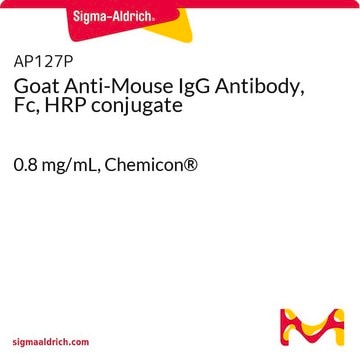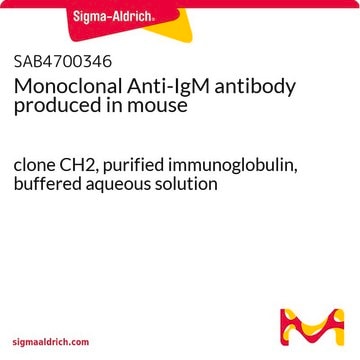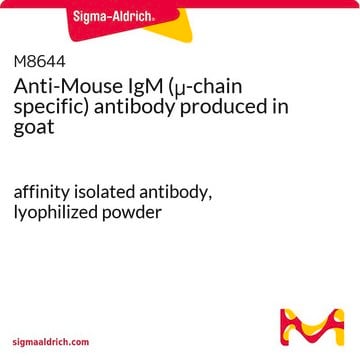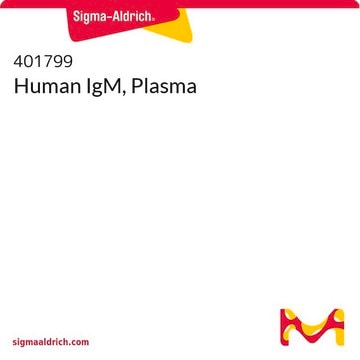M3795
IgM, Kappa from murine myeloma
clone TEPC 183, purified immunoglobulin, buffered aqueous solution
Synonym(s):
Mouse IgM-κ
Sign Into View Organizational & Contract Pricing
All Photos(1)
About This Item
Recommended Products
biological source
mouse
Quality Level
conjugate
unconjugated
antibody form
purified immunoglobulin
clone
TEPC 183, monoclonal
Assay
≥90% (HPLC)
form
buffered aqueous solution
concentration
2.0-2.2 mg/mL
shipped in
dry ice
storage temp.
−20°C
target post-translational modification
unmodified
Looking for similar products? Visit Product Comparison Guide
General description
Determined by the absorbance at 280 nm (E1%/280 = 11.8). Each vial contains at least 1 mg of purified myeloma protein.
IgM antibodies are present as pentamers in the serum and are produced in response to antigens IgM, κ from murine myeloma is produced by TEPC 183 tumor line introduced subcutaneously in BALB/c mice.
IgM is a highly conserved antibody in vertebrates and is expressed early during immune response. It is secreted by peritoneal B cells.
Specificity
The TEPC 183 tumor line is pristine-induced plasmacytoma-originated and carried subcutaneously in BALB/c mice. The hapten binding specificity of the TEPC 183 line has not been determined. It specifically recognizes mouse IgM. Identity and purity of the immunoglobulin is established by immunoelectrophoresis.
Application
IgM, Kappa from murine myeloma has been used in:
- sandwich enzyme linked immunosorbent assay (ELISA)
- flow cytometry
- dot-immunobinding assay
Biochem/physiol Actions
IgM plays a key role in the engulfing of apoptotic cells. A reduction in serum IgM levels leads to increased autoimmune response and higher risk for infections. IgM displays polyreactive and autoreactive functionality. It plays a key role in tissue homeostasis by mediating clearance of tissue based molecules. IgM has sites for N-linked glycosylation, with sugars namely, mannose, galactose, N-acetyl glucosamine and sialic acid. IgM linked agarose resins have been tested for efficient conjugate binding.
Physical form
Solution in 0.05 M Tris, 0.5 M sodium chloride, pH 8.0, containing 0.02% sodium azide
Disclaimer
Unless otherwise stated in our catalog or other company documentation accompanying the product(s), our products are intended for research use only and are not to be used for any other purpose, which includes but is not limited to, unauthorized commercial uses, in vitro diagnostic uses, ex vivo or in vivo therapeutic uses or any type of consumption or application to humans or animals.
Storage Class Code
12 - Non Combustible Liquids
WGK
WGK 1
Flash Point(F)
Not applicable
Flash Point(C)
Not applicable
Personal Protective Equipment
dust mask type N95 (US), Eyeshields, Gloves
Certificates of Analysis (COA)
Search for Certificates of Analysis (COA) by entering the products Lot/Batch Number. Lot and Batch Numbers can be found on a product’s label following the words ‘Lot’ or ‘Batch’.
Already Own This Product?
Find documentation for the products that you have recently purchased in the Document Library.
Customers Also Viewed
A fast and simple dot-immunobinding assay for quantification of mouse immunoglobulins in hybridoma culture supernatants
Sulimenko T and Draber P
Journal of Immunological Methods, 289(1-2), 89-95 (2004)
Matthew P Collin et al.
Transplantation, 79(6), 722-725 (2005-03-24)
Graft-versus-host disease (GvHD), a life-threatening complication of bone marrow transplantation, is initiated by donor T cells reacting to recipient dendritic cells (DC). GvHD can be controlled by attenuating donor T cells, but few strategies exist to target DC, particularly resident
Sequential genetic modification of the hprt locus in human ESCs combining gene targeting and recombinase-mediated cassette exchange
Di Domenico AI, et al.
Cloning and Stem Cells, 10(2), 217-230 (2008)
T Sulimenko et al.
Journal of immunological methods, 289(1-2), 89-95 (2004-07-15)
Mouse monoclonal antibodies of IgG subclasses and IgM class in hybridoma culture supernatants were quantified using a dot-immunobinding assay. Immunoglobulins were bound to nitrocellulose (NC) membrane and, after blocking, the membrane was incubated with anti-mouse antibody conjugated to horseradish peroxidase
A monoclonal antibody that specifically binds chitosan in vitro and in situ on fungal cell walls
Schubert M, et al.
Journal of microbiology and biotechnology, 20(8), 1179-1184 (2010)
Our team of scientists has experience in all areas of research including Life Science, Material Science, Chemical Synthesis, Chromatography, Analytical and many others.
Contact Technical Service











